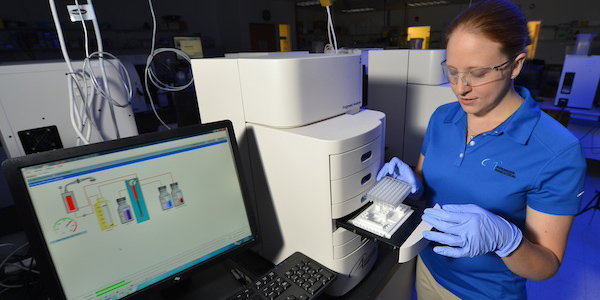
Battling For Quality In Cupcakes And Technology
Whether donning an apron to create delicious confections, or safety glasses to test the inner workings of scientific instruments, Katherine Hickman’s goal is the same— to ensure quality excellence.
By day, Katherine (Kleinwort) Hickman (’10 food science) is a quality assurance specialist for Advanced Analytical Technologies in the Iowa State University Research Park. By night, she helps prepare Ames Cupcake Emporium for battle on the national television stage on The Food Network show Cupcake Wars.
Hickman, a native of St. Ansgar, Iowa, began her journey at Iowa State University in 2007 after receiving her pastry and baking degree from Le Cordon Bleu College in Minneapolis, Minn. An avid baker since childhood, Hickman enjoyed the challenge of baking, “It’s chemistry at work,” she says. “If even one thing is slightly off the entire outcome is affected.”
In 2010, Hickman visited the newly opened Ames Cupcake Emporium, met owner Tawnya Zerr and created a lasting friendship and partnership.
According to Zerr, Hickman’s aptitude in the kitchen and knowledge of food science made her the obvious choice to help as the assistant baker on Cupcake Wars. “She’s great,” says Zerr. “She knows her way around a kitchen, and can problem solve.”
“Biology, chemistry, food science and quality are all things I learned in college,” says Hickman. “Ingredient interaction and quality control were especially helpful with Cupcake Wars.”
Those same skills led Hickman to her chosen career in quality assurance.
Advanced Analytical Technologies manufactures and sells an analytical instrument called the fragment analyzer. It is used by researchers in hospitals, museums and agricultural companies around the world to simultaneously measure the size and amount of DNA and RNA in samples. Samples can be used for a variety of research such as analyzing properties of DNA in seed corn.
Hickman describes the process, on a macro scale, as similar to sorting vegetables in a basket—vegetables are separated from one another and the quantity of each is determined.
“Iowa State owns two of our instruments for research in food science and human nutrition and molecular biology,” Hickman says. “And our machines are on six of the seven continents.” Hickman has enjoyed reconnecting with one of her favorite food science and human nutrition professors, Lester Wilson.
“I noticed the viscosity of the gel in one of our machines wasn’t correct; the DNA wasn’t being separated correctly,” she says. “We worked together to determine the correct viscosity of the gel, and develop new specifications for the product.”


